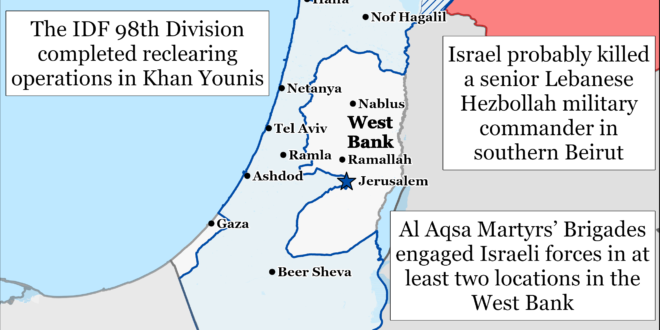The Israel Defense Forces (IDF) likely killed a senior Lebanese Hezbollah commander in southern Beirut on July 30. The IDF Air Force targeted Fuad Shukr in response to a Hezbollah rocket attack that killed 12 Israeli children in the Israel-controlled Golan Heights on July 27.[1] The IDF claimed that the strike killed Shukr while Lebanese sources said he survived the strike.[2] A Saudi government-owned media outlet and a Lebanese outlet both also confirmed that Shukr died in the strike.[3] Hezbollah has not commented at the time of this writing. Shukr was a senior military advisor to Hezbollah Secretary General Hassan Nasrallah and equivalent to “Hezbollah‘s chief of staff,“ according to Israeli media.[4] He also served on Hezbollah’s highest military body, the Jihad Council.[5] Shukr is the second member of the Jihad Council whom the IDF has killed. The IDF also killed the Islamic Revolutionary Guard Corps representative to the Jihad Council, Mohammad Reza Zahedi, on April 1 in Damascus.[6] The IDF claimed that Shukr headed a Hezbollah unit responsible for maintaining advanced weaponry and planning attacks against Israel.[7] The IDF initially did not specify that the strike targeted Shukr, only that it struck “the commander responsible for” the Majdal Shams rocket attack.[8]
CTP-ISW is considering two possible Hezbollah courses of action after the IDF strike that likely killed Fuad Shukr:
Hezbollah may decide to respond with a major rocket and drone barrage on northern Israel that resembles previous Hezbollah attacks in retaliation for previous IDF strikes on senior commanders. Hezbollah has previously responded by launching salvoes of 100+ rockets targeting IDF bases in northern Israel and the Golan Heights.[9] Hezbollah could attempt to build a strike package that it calibrates to avoid a strong Israeli response, thereby allowing tensions on the border to diffuse and return to the standard tit-for-tat attacks. Hezbollah’s strike package would presumably be larger and strike deeper into Israel than past retaliatory attacks given Shukr’s seniority, however.[10] Israeli sources said immediately after the strike targeting Shukr that this would be the extent of Israel’s response to the Majdal Shams rocket attack, and that further escalation is dependent on Hezbollah’s response.[11] Hezbollah officials messaged on July 29 that Hezbollah did not want an all-out war, suggesting that Hezbollah will temper its response to deescalate the situation.[12] There remains the risk that even a carefully calculated strike package would unintentionally strike a sensitive target in Israel and prompt further escalation.
Hezbollah may decide that in order to restore deterrence with Israel, it needs to conduct a more significant attack that targets civilian and military areas deep inside Israel. This is the less likely but more dire course of action. Hezbollah could calculate that the Israeli strike targeting a senior Hezbollah leader in Beirut who was personally close to Secretary General Hassan Nasrallah crosses a red line and requires a strong Hezbollah show of force to restore deterrence. A senior Lebanese Hezbollah official told Al Jazeera before the targeted strike on Shukr that Hezbollah would respond to any attack on Lebanon and that Hezbollah is capable of striking military installations in Haifa, the Golan Heights and Ramat David.[13] Nasrallah threatened on July 17 to attack civilian targets deep into Israel in response to Israeli airstrikes that kill Lebanese civilians.[14] The IAF strike in southern Beirut killed at least three people and injured 74, according to the Lebanese Ministry of Health speaking to Hezbollah-run media.[15]
Iran gave its “full blessing” to Iranian-backed Iraqi militias to resume attacks targeting US forces if Israel conducts a “massive retaliatory assault” targeting Hezbollah and/or non-Hezbollah targets in Lebanon, according to a senior Iraqi militia leader who spoke to BBC on July 30.[16] The militia leader emphasized that “Lebanon, and not only Hezbollah, is our red line.”[17] It is unclear whether Israel’s retaliatory strike targeting Fuad Shukr on July 30 constitutes a “massive retaliatory assault.” The Islamic Resistance in Iraq—a coalition of Iranian-backed Iraqi militias—conducted over 160 attacks targeting US forces in Iraq and Syria between October 2023 and February 2024.[18] The group suspended attacks targeting US forces following a one-way drone attack that killed three US personnel in northeastern Jordan in late 2024.[19] The militia leader told BBC that senior Iranian-backed Iraqi militia leaders are currently in Tehran to attend Iranian President Masoud Pezeshkian’s inauguration ceremony.[20] He added that the militia leaders have met with Supreme Leader Ali Khamenei and unspecified Islamic Revolutionary Guards Corps (IRGC) and IRGC Quds Force commanders on the sidelines of the ceremony.
The Islamic Resistance in Iraq—a coalition of Iranian-backed Iraqi militias—has officially resumed its attack campaign targeting US forces in the Middle East.[21] Harakat Hezbollah al Nujaba spokesperson Mahdi al Kaabi announced the resumption of the attack campaign on July 30 and warned that the Islamic Resistance in Iraq could target US bases “at any moment.”[22] Kaabi added that the Islamic Resistance in Iraq “does not believe [that the United States should have] advisers or bases [in Iraq]” and emphasized the need for Iraq to diversity its sources of weapons and military equipment.[23] Kaabi’s announcement follows recent warnings from Iranian-backed Iraqi militias that they would resume attacks targeting US forces if the Iraqi federal government did not set a timeline for the withdrawal of US troops from Iraq.[24] Iranian-backed Iraqi militias have conducted four attacks targeting US forces in Iraq and Syria since July 16.[25] CTP-ISW assessed on July 17 that Iranian-backed Iraqi militias appeared to have resumed their attack campaign targeting US forces in Iraq.[26]
The Iranian Parliament swore in Masoud Pezeshkian as Iran’s ninth president on July 30.[27] Many Iranian political and military officials, as well as 88 foreign delegations, attended the inaugurations.[28] Parliament Speaker Mohammad Bagher Ghalibaf claimed that Iran did not experience the “slightest tension” in the transition from Ebrahim Raisi’s presidency to Masoud Pezeshkian‘s presidency during a speech at the inauguration ceremony.[29] President Masoud Pezeshkian also gave a speech in which he described himself as ”belonging to all Iranians and committed to the priority of national interests.”[30] Pezeshkian vowed to try to solve economic issues, such as high costs of living. Pezeshkian added that “the priority of my foreign policy is to strengthen relations with neighboring countries,“ echoing former President Ebrahim Raisi’s ”neighborhood policy.”[31] This policy seeks to build relations with regional states.[32] He condemned Israeli actions in the Israel-Hamas war and affirmed his support for Palestinians.[33] Pezeshkian emphasized that Iran’s ”commitment” to negotiations should have brought ”negotiating parties to the understanding that [Iran adheres] to [its] commitments.”[34] This comment is consistent with previous regime statements that place the onus of returning to nuclear negotiations on the West, and particularly on the United States.
Supreme Leader Ali Khamenei and newly sworn-in President Masoud Pezeshkian held meetings with numerous foreign officials and Axis of Resistance leaders on the sidelines of the presidential inauguration on July 29 and 30. Khamenei met with Hamas Political Bureau Chairman Ismail Haniyeh and Palestinian Islamic Jihad (PIJ) Secretary General Ziad al Nakhalah to discuss regional security, the ongoing Israel-Hamas war, and Iranian cooperation with Hamas and PIJ.[35] Khamenei also met with Iraqi Prime Minister Mohammad Shia al Sudani, Armenian Prime Minister Nikol Pashinyan, and Tajik President Emomali Rahmon.[36] Khamenei described the Zangezur Corridor as ”detrimental to Armenia” during his meeting with Pashinyan.[37] The Iranian regime has historically opposed Azerbaijani and Turkish efforts to establish the Zangezur corridor between Azerbaijan proper and the Nakhchivan Autonomous Republic because such a corridor would sever Iran’s land access to Russia and Europe via Armenia.[38] President Masoud Pezeshkian also met separately with Haniyeh and senior Houthi official Mohammad Abdulsalam to discuss the Israel-Hamas War. Pezeshkian underlined Iran’s support for the Palestinian people and the Houthis.[39] Pezeshkian also held meetings with the Armenian prime minister, the Turkmen deputy prime minister, the Georgian prime minister, the Kazakh senate chairman, the Uzbek parliament speaker, the Kyrgyz deputy prime minister and the Malaysian parliament speaker.[40]
IRGC Navy Commander Rear Admiral Ali Reza Tangsiri stated that the IRGC Navy seeks to “expand the geography of [its] missions,” which is consistent with the IRGC Navy’s ongoing effort to expand the scope of its operations beyond the Persian Gulf.[41] Tangsiri made this statement during an IRGC naval commander conference in Mashhad, Khorasan Razavi Province, on July 30.[42] Tangsiri stated that the IRGC Navy seeks to conduct “ocean missions” with the Artesh Navy, which is Iran’s traditional blue-water navy.[43] The IRGC Navy is currently responsible for the Persian Gulf, while the Artesh Navy primarily operates around the Caspian Sea and Indian Ocean.[44] The IRGC Navy has sought to expand the range of its operations since 2020, when Supreme Leader Ali Khamenei called on the IRGC Navy to increase Iran’s ability to confront adversaries in ”distant waters.”[45] Tangsiri previously claimed in September 2022 that the IRGC Navy’s Shahid Soleimani could travel 9,000 kilometers from the Persian Gulf.[46] Tangsiri also claimed that the IRGC Navy produces missiles with a range of between 10 and 2,000 kilometers.[47]
The July 29 break-in to an IDF base by Israeli protesters forced IDF Chief of Staff Lieutenant General Herzi Halevi to temporarily withdraw from meetings discussing the Israel’s military plans for Lebanon and the situation in northern Israel.[48] An Israeli military correspondent reported that around 1,200 protestors gathered around the Beit Lid base to protest the detainment of nine Israeli soldiers for the alleged “substantial abuse” of a Palestinian fighter in an Israeli detention center.[49] The protestors broke into the Beit Lid base to release the detained Israeli soldiers by force and left the base after finding out that the detained Israeli soldiers were no longer there.[50] The IDF postponed the court hearings of non-urgent cases scheduled for July 30 to reduce the presence of civilians in the courtroom after protestors broke into the court premises in Beit Lid on July 29.[51] The IDF reportedly moved additional troops from across the West Bank to reinforce the security of the Beit Lid base.[52]
Key Takeaways:
- Lebanon: The Israel Defense Forces (IDF) likely killed a senior Lebanese Hezbollah commander in southern Beirut on July 30. Hezbollah may decide to respond with a major rocket and drone barrage on northern Israel that resembles previous Hezbollah attacks in retaliation for previous IDF strikes on senior commanders. In an alternative scenario, Hezbollah may decide that in order to restore deterrence with Israel, it needs to conduct a more significant attack that targets civilian and military areas deep inside Israel.
- Iran: Iran gave its “full blessing” to Iranian-backed Iraqi militias to resume attacks targeting US forces if Israel conducts a “massive retaliatory assault” targeting Hezbollah and/or non-Hezbollah targets in Lebanon, according to a senior Iraqi militia leader who spoke to BBC on July 30. It is unclear whether Israel’s retaliatory strike targeting Fuad Shukr on July 30 constitutes a “massive retaliatory assault.”
- Iraq and Syria: The Islamic Resistance in Iraq—a coalition of Iranian-backed Iraqi militias—has officially resumed its attack campaign targeting US forces in the Middle East. CTP-ISW assessed on July 17 that Iranian-backed Iraqi militias appeared to have resumed their attack campaign targeting US forces in Iraq.
- Iranian Presidential Inauguration: The Iranian Parliament swore in Masoud Pezeshkian as Iran’s ninth president on July 30. Supreme Leader Ali Khamenei and newly sworn-in President Masoud Pezeshkian held meetings with numerous foreign officials and Axis of Resistance leaders on the sidelines of the presidential inauguration on July 29 and 30.
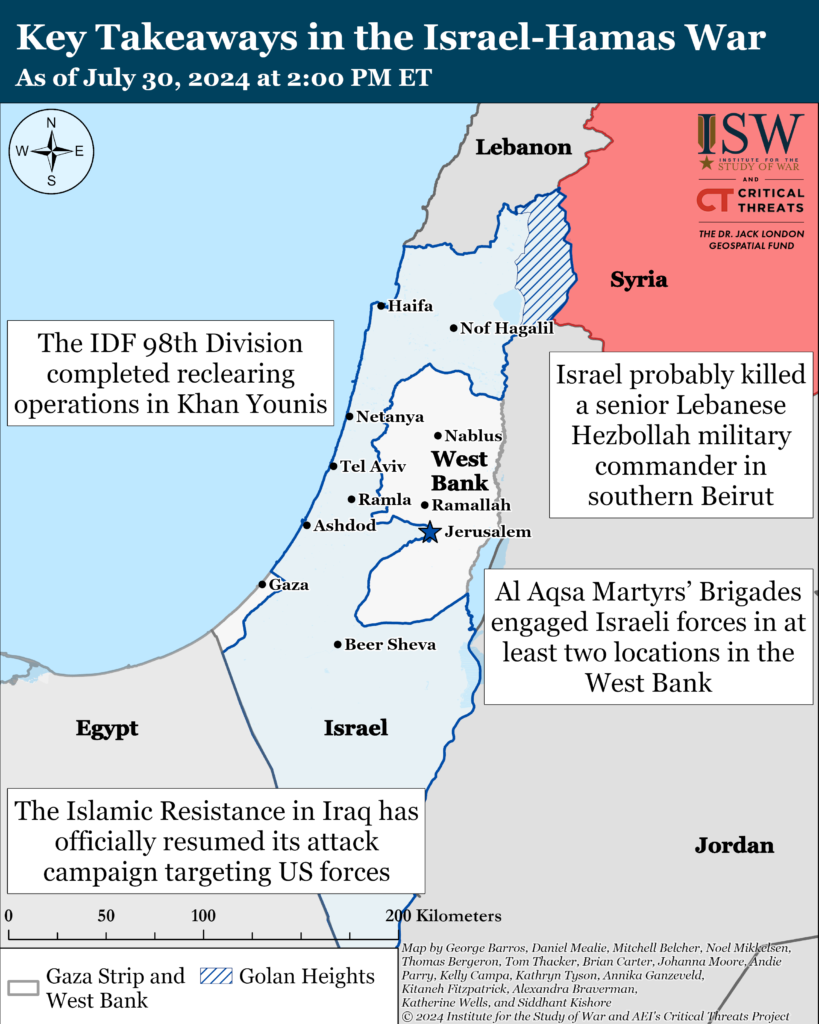
Gaza Strip
Axis of Resistance objectives:
Erode the will of the Israeli political establishment and public to sustain clearing operations in the Gaza Strip
Reestablish Hamas as the governing authority in the Gaza Strip
Palestinian fighters targeted Israeli forces reportedly operating in Tal al Hawa on July 30. The al Aqsa Martyrs’ Brigades that claimed its fighters fired a thermobaric rocket targeting Israeli forces barricaded in a building in Tal al Hawa.[53] An al Aqsa Martyrs’ Brigades sniper reportedly shot and killed an Israel Defense Forces (IDF) soldier in Tal al Hawa.[54] Palestinian Islamic Jihad (PIJ) and the al Aqsa Martyrs’ Brigades conducted separate mortar attacks targeting Israeli infantry and armored vehicles near the al Baraa Mosque in southern Tal al Hawa.[55]
The 3rd “Alexandroni Brigade” continued clearing operations along the Netzarim Corridor on July 30.[56] The ”Alexandroni Brigade” is operating under the 252nd Division, after having operated under the 99th Division until July 30. Israeli forces conducted raids on “targeted locations,” killed Palestinian fighters, and destroyed militia infrastructure. The “Alexandroni” Brigade directed an airstrike targeting a group of Hamas fighters operating in a building within the brigade’s area of operations.[57] The al Aqsa Martyrs’ Brigades and Ansar Brigades—the armed wing of the Palestinian Freedom Movement—conducted a combined rocket attack targeting Israeli forces operating along the Netzarim Corridor.[58]
The IDF killed a Hamas Nuseirat Battalion fighter responsible for anti-tank weapons on July 30.[59] The IDF reported that the fighter supported attacks against Israeli forces and taught other fighters.
The IDF 98th Division completed re-clearing operations in Khan Younis on July 30.[60] The IDF reported that Israeli forces in Khan Younis killed over 150 Palestinian fighters, destroyed militia infrastructure, and seized weapons during operations since July 22. Geolocated footage showed civilians returning to eastern Khan Younis and Bani Suhaila on July 30.[61] The IDF launched a clearing operation into Khan Younis on July 22 to disrupt Hamas’ efforts to reconstitute in the governorate.[62] CTP-ISW previously assessed that Hamas forces throughout the Strip remain combat-effective and are attempting to reconstitute with some success.[63]
The IDF assessed that it will likely gain new information on the location of Israeli hostages as it reviews intelligence obtained during operations in the Gaza Strip but warned that the likelihood that hostages will be found alive will decrease “as time goes on.”[64] The IDF’s report comes after the 98th Division recovered the bodies of five hostages in Khan Younis on July 24 who were killed during the October 7, 2023, attack.[65] The IDF recovered the bodies after receiving intelligence from a Palestinian fighter detained during operations in the Gaza Strip.
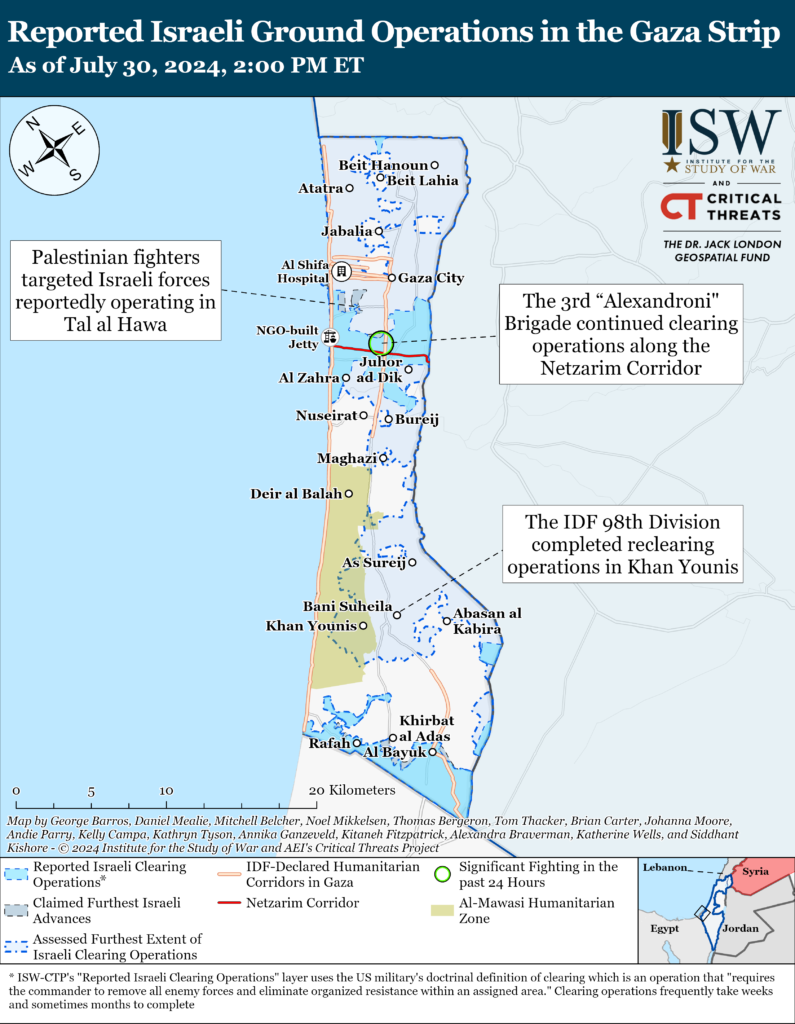
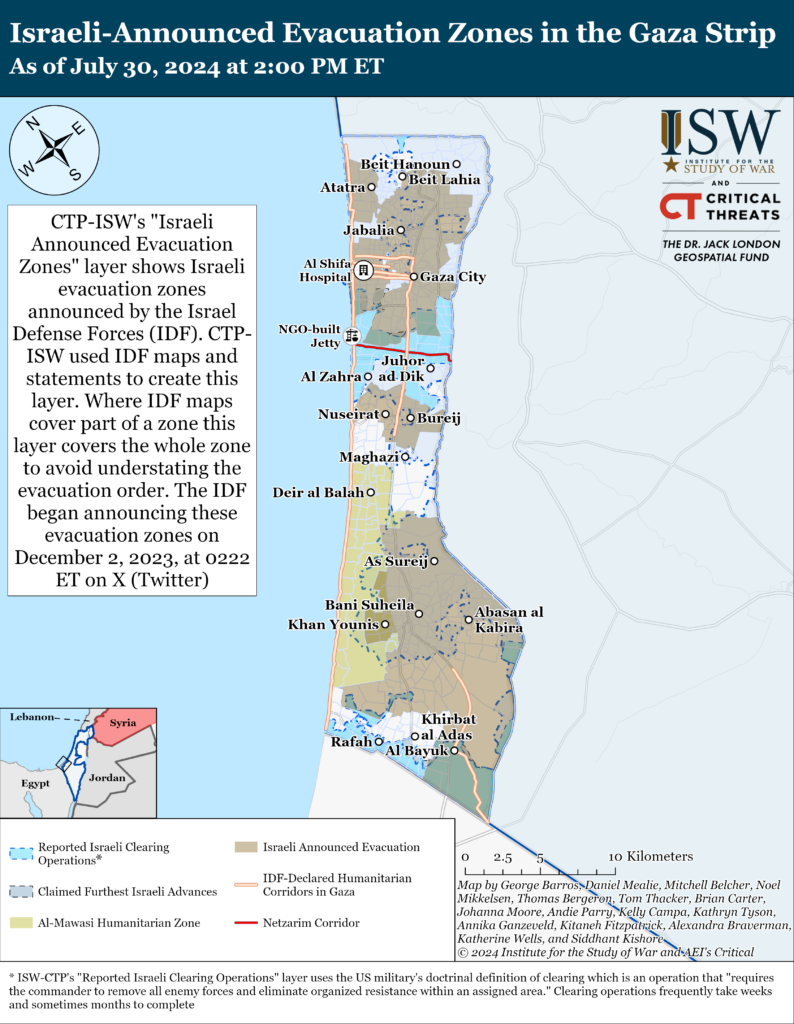
CTP-ISW did not record any Palestinian militia indirect fire attacks from the Gaza Strip into southern Israel since CTP-ISW’s last data cut-off on July 29.
West Bank
Axis of Resistance objectives:
Establish the West Bank as a viable front against Israel
The al Aqsa Martyrs’ Brigades has engaged Israeli forces in at least two locations in the West Bank since CTP-ISW’s last data cut-off on July 29.[66] Al Aqsa Martyrs’ Brigades fired small arms and detonated improvised explosive devices (IEDs) targeting Israeli forces in Ein Beit al Ma refugee camp, Nablus.[67]
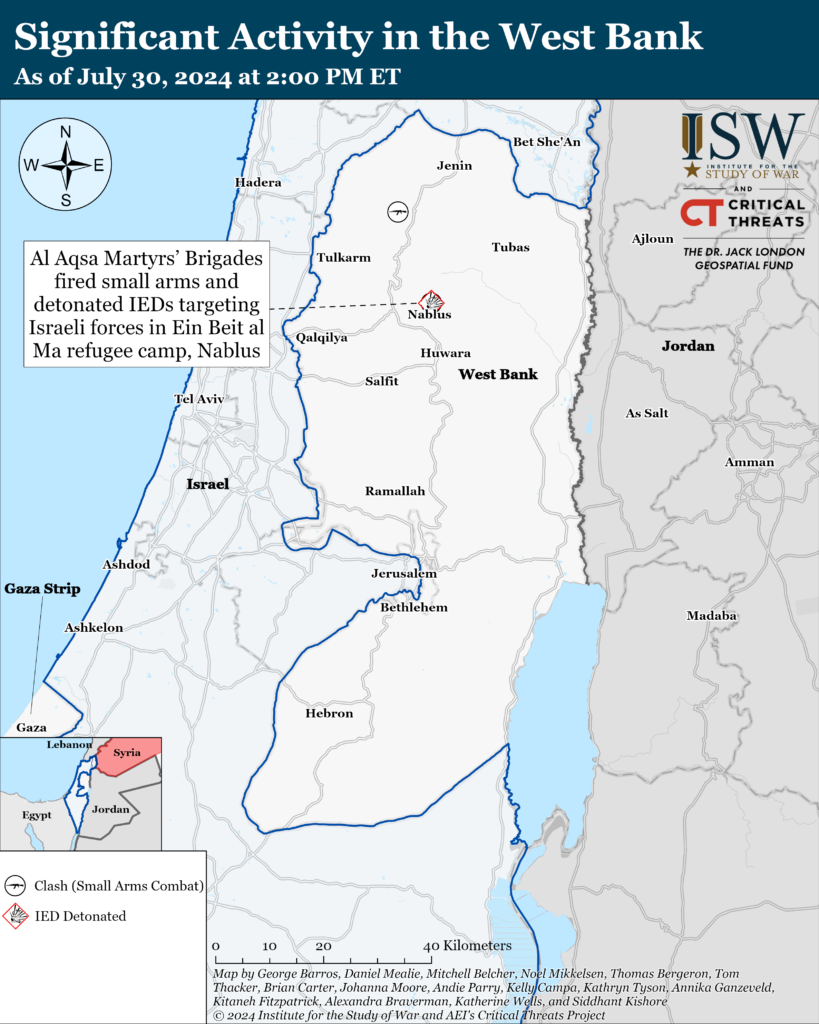
This map is not an exhaustive depiction of clashes and demonstrations in the West Bank.
Southern Lebanon and Golan Heights
Axis of Resistance objectives:
Deter Israel from conducting a ground operation into Lebanon
Prepare for an expanded and protracted conflict with Israel in the near term
Expel the United States from Syria
Lebanese Hezbollah has conducted at least 10 attacks into northern Israel since CTP-ISW’s last data cut-off on July 29.[68] Hezbollah conducted the 10 attacks before the IDF Air Force targeted a senior military commander in Beirut.[69] Hezbollah targeted the Beit Hillel barracks near Kiriyat Shimona in three separate attacks on July 30.[70] Hezbollah targeted the base with two salvoes of Katyusha rockets and with a wave of one-way attack drones.[71] One of the rockets struck a town near the barracks and killed an Israeli civilian.[72]
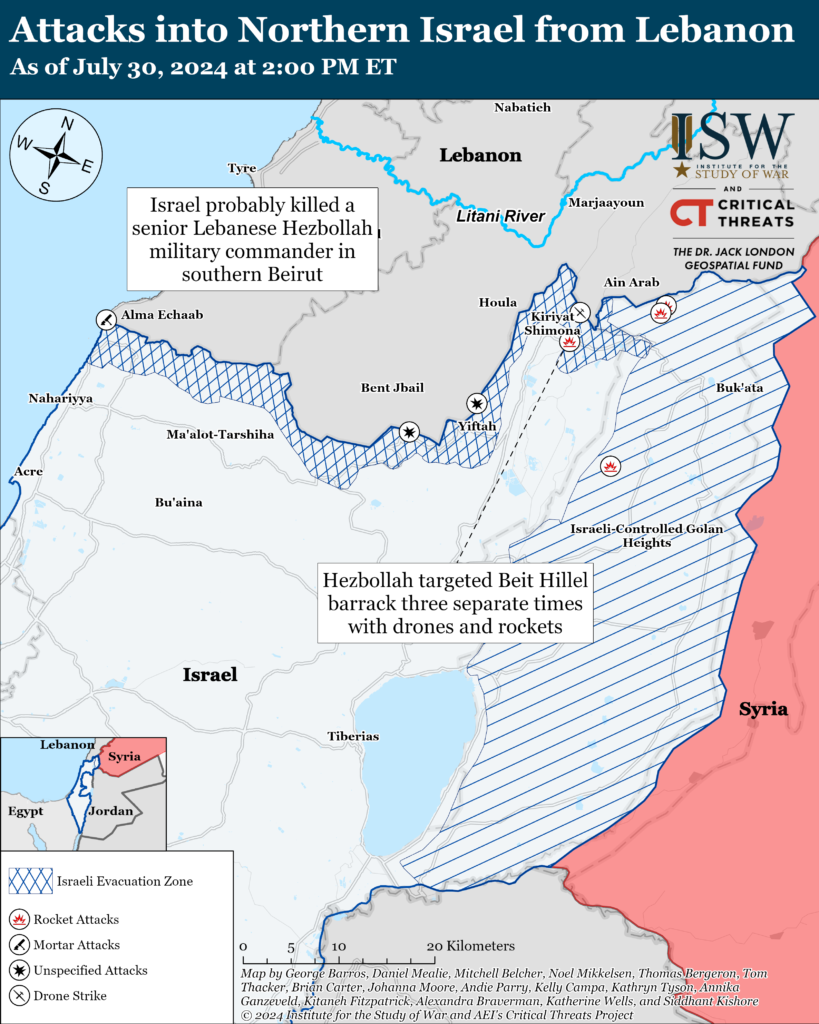
The IDF Air Force struck Syrian Arab Army sites in southern Daraa on July 29, according to local Syrian sources.[73] The IDF did not comment on the strike.
Iran and the Axis of Resistance
The US Treasury Department’s Office of Foreign Assets Control (OFAC) imposed sanctions on five individuals and seven entities for facilitating Iran’s missile and drone program on July 30.[74]
OFAC sanctioned China-based Beijing Shiny Nights Technology Development Co., Ltd. (Beijing SNTD), which is an Iranian Defense Ministry front company that procures electronics and equipment on behalf of the Iranian Defense Ministry.
Iran and China-based Iranian national Sayyed Ali Seraj Hashemi is a Beijing SNTD employee who has helped procure accelerometers and gyroscopes for Iran’s ballistic missile program.
Iranian national Saeed Hamidi Javar has helped procure accelerometers and gyroscopes for Beijing SNTD. Javar works closely with Sayyed Ali Seraj Hashemi.
Saeed Hamidi Javad manages the Buy Best Electronic Pars Company (BBEPC), which is an electronic component supplier with branches in both Iran and China. Javar has also helped procure unspecified materials for Iran’s Aerospace Industries Organization (AIO).
OFAC sanctioned Electro Optic Sairan Industries Co. (SAPA), which is a subsidiary of the Iran Electronic Industry (IEI), which has procured military equipment and developed technologies for the Iranian Defense Ministry. SAPA has also contributed to the US-sanctioned Shahed Aviation Industries Research Center’s (SAIRC) development of Shahed drones.
Iran-based Mohammad Abdollahi, is SAPA’s business manager and procurement official.
Hong Kong-based Thomas Ho Ming Tong has procured optical components for SAPA. Tong uses the following China and Hong Kong-based companies to procure and arrange payments for components from SAPA:
Tas Technology Company Limited
Cloud Element Company Limited
Btw International Limited
OFAC sanctioned Bright Shore Inc Limited Azmoon Pajohan Hesgar Limited Liability Company (APH), which is a test equipment manufacturer and is responsible for coordinating the procurement of electronic components and missile applicable items, like gyroscopes, for organizations subordinate to the Iranian Defense Ministry.
Iran-based Ezzatullah Ghasemian Sorbani is the managing director and chairman of the board of directors of APH.
OFAC sanction China-based Shenzhen Rion Technology Co., Ltd., which is a technology company that promotes its products, including items with drone applications, for purchase in Iran.
Iranian Parliament Speaker Mohammad Bagher Ghalibaf met with several foreign parliamentary officials in Tehran on July 29 and 30 on the sidelines of President Masoud Pezeshkian’s inauguration ceremony.[75] Ghalibaf discussed strengthening economic and diplomatic cooperation with Malaysia in multilateral parliamentary organizations during a meeting with his Malaysian counterpart.[76] The Sri Lankan parliament speaker separately thanked Iran for preventing power plant shutdowns in Sri Lanka, in reference to the 514-million-dollar hydropower and irrigation project built by an Iranian contractor and inaugurated in April, during his meeting with Ghalibaf.[77] The parliament speaker of Burkina Faso told Ghalibaf that his country is actively fighting terrorism and ”counts on Iran for the continuation of stability [in Burkina Faso.]”[78] Ghalibaf also met with the parliament speakers of Comoros and Mali, as well as the deputy parliament speaker of Ghana.[79]
Iranian security forces arrested four Jaish al Adl militants transporting weapons in Khash, Sistan and Baluchistan Province, on July 30.[80] Jaish al Adl is a Baloch Salafi-jihadi group that operates along the Iranian border with Pakistan. The security forces also seized weapons and ammunition during the arrest. The arrests come amid an uptick in anti-regime militancy in southeastern Iran since December 2023.
US Central Command (CENTCOM) destroyed a Houthi drone in a Houthi-controlled area of Yemen.[81] CENTCOM determined that the drone presented an imminent threat to US, coalition forces, and merchant vessels in the region.
 Eurasia Press & News
Eurasia Press & News
